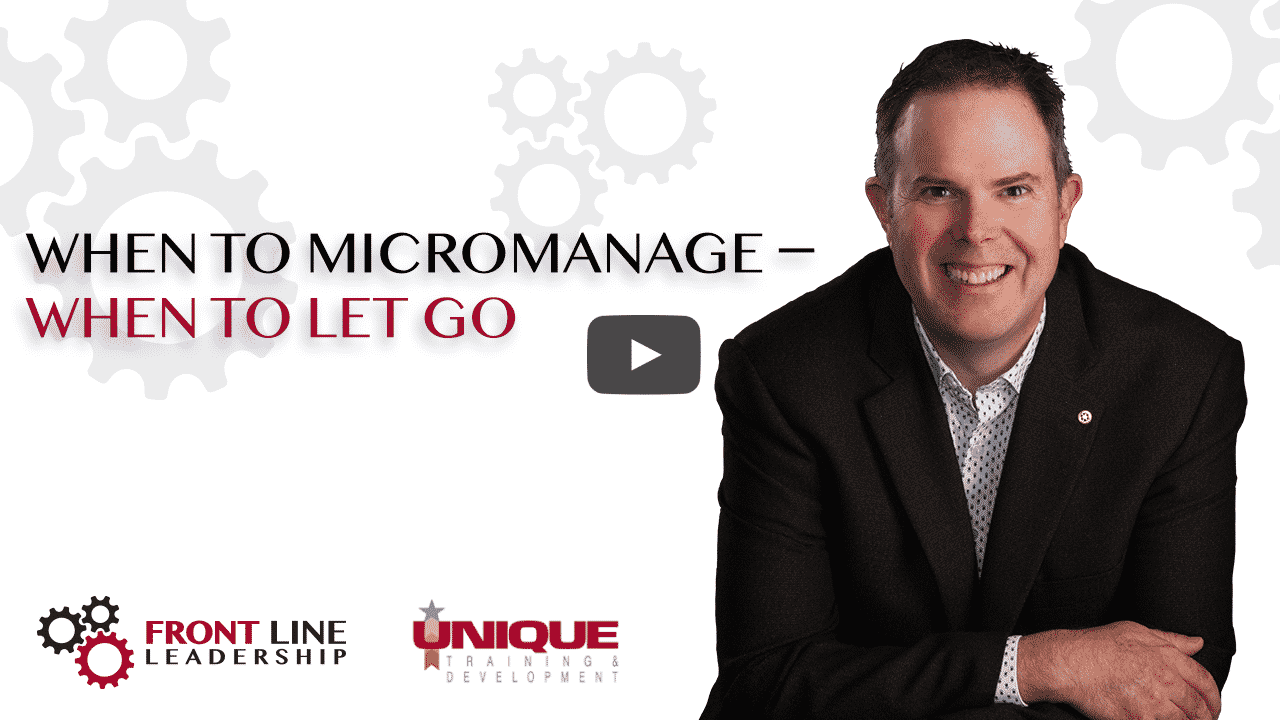When To Micromanage – When To Let Go
Hi ~Contact.FirstName~,
Knowing when to dive in and when to step back is a key skill for any leader.
When should you, as the leader, dive in and maybe even micromanage on a short-term basis, and when should you step back and let your team take charge of a situation?
Nobody likes it when they're micromanaged. You can agree with that.
You probably don't like it when your boss is over your shoulder saying, "Are you done yet? Why did you do it that way? I wouldn't have done it that way." Nobody likes being micromanaged, but according to my informal surveys, about one third of people are micromanaged by their boss. Yet, there are times when you should get deep into the weeds and actually micromanage on purpose.
When to Micromanage on Purpose
When your department's performance has taken a quick turn in a negative way, you likely need to dig in and find out what’s causing it. Is it the behavior of a specific member of your team? Is it a piece of equipment or a new vendor that didn’t give you the quality of material you were used to using?
Doing a deep dive can allow you as the leader to go in and find out exactly what's happening. And that should happen right in the factory or the production line next to where it's occurring.
There is a concept called “Gemba”, which is to go and put eyes on the situation. You can't sit back in the office and try to figure out what's going on. Go and see, ask lots of questions, get in there. It might make people uncomfortable, but that kind of micromanagement can help you figure out the source of the problem and the possible solutions or remedies.
You need to know when to back out.
We know that people don't like their boss to micromanage them or be overly involved in their day-to-day work, especially around how they do it. They need to know from you what the expectations are. They need to know what good and bad is in terms of quality and output, but they don't like it when you interfere with the specific job tasks. You need to back out of micromanaging all the little tasks and even all the little deadlines.
It's important to tell people what the goals are, how much you need from them, and some suggested procedures and methods they might follow, but at the end of the day, get out of their way and trust them to get the work done.
Provided the output is meeting your expectations, you can stay back and observe.
After all, that makes it easier on you as a leader.
Remember - you don't want to stay overly involved in all the details because that tells your team you don't trust them and it consumes a lot of your time and energy you could put towards other activities.
Watch the full video here.

Share on:



|
|
Front Line Leadership Public Workshops
Book your calendar! Upcoming public workshops for your front line supervisors, team leaders and managers are coming in these locations!
Oakland, CA, USA – February 26th & 27th, 2020 – TBA
Toronto, ON, Canada – March 3rd & 4th, 2020 – Centre for Health and Safety Innovation
Chicago, IL, USA – March 4th & 5th, 2020 – O'Hare Airport Area
Atlanta, GA, USA – March 11th & 12th, 2020 – North Atlanta Area
Windsor, ON, Canada – March 11th & 12th, 2020 – Hampton Inn and Suites
I am a button →
Public course details and registration
| |
|
|
|
|
|
|
| |
| |
Thank you for investing your time in developing your leadership skills. Accept our best wishes for success on your leadership journey.
Sincerely,
Greg Schinkel, CSP
President Front Line Leadership Systems
|
|
|
|
|
|
Subscribe to the LeaderFeeder Podcast
| |
| |
|
|
|
|